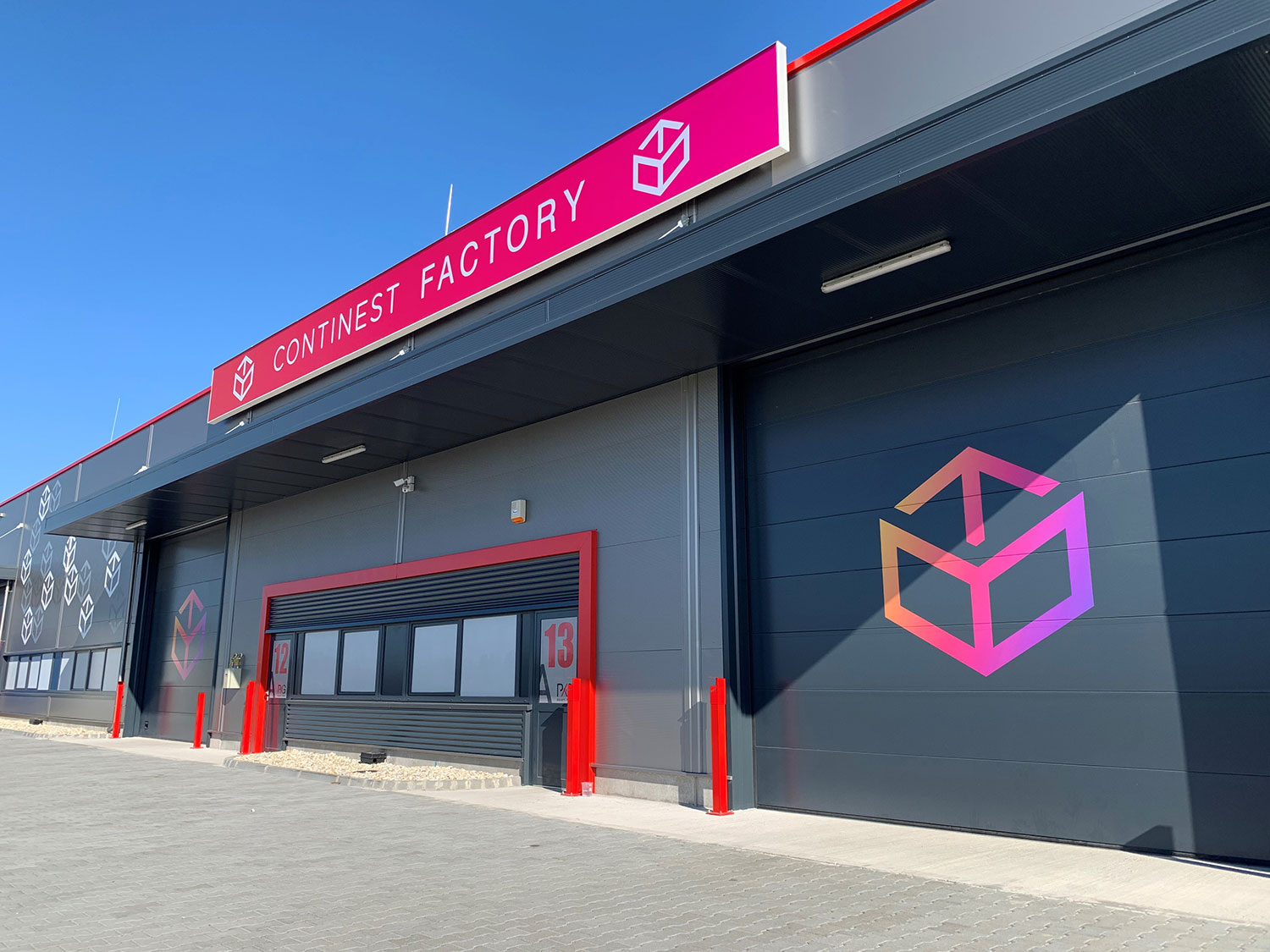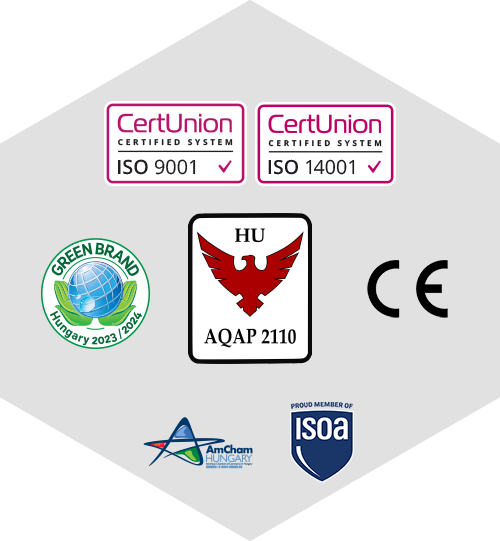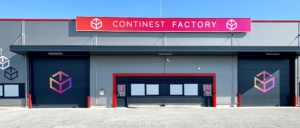Continest Delivers Collapsible Containers Into Ever-expanding Market
Busy building his company, Continest CEO Vidor Kis-Márton, didn’t take a summer holiday from 2016 until last year. It was an investment that today is reaping its rewards.
Based in Székesfehérvár, 65 km southwest of Budapest, Continest manufactures collapsible containers. Under Kis-Márton’s guidance, revenues more than doubled to HUF 3.88 billion in 2022, and it looks set to repeat the feat to hit HUF 9 bln this year.
Its current complement of 86 employees is expected to produce 2,000 containers this year, of which 80% will be exported, primarily to the United Kingdom, Scandinavia, Germany, Australia and the United States. Continest has come a long way in a relatively short time, but it started with a chance meeting.
“In 2016, me, Dáni [co-founder Dániel Tegzes], and Máté [a business colleague] did this tour of Hungary, looking for business opportunities. And one of the stops during the trip was a company that, at that time, was an infrastructure supplier to Sziget Festival. They were dealing with power generators, fencing, everything, and using collapsible containers,” Kis-Márton recalls.
They had discovered what he now terms the “preliminary life” of Continest. [See box for the genesis of the foldable container].
Kis-Márton and Tegzes felt they were onto something. In a world that was seeing an ever-increasing number of events, each needing temporary, secure space and accommodation, they reckoned the potential demand for collapsible units, rather than the classical solid box, had to be huge.
The pair tracked down Rob van den Berg, bought the design from him, and, recognizing their lack of engineering knowledge, invited the Dutchman to come on board as technical adviser.
“That was one of the most important decisions we made. He’s been with us since 2016,” says Kis-Márton.
Water in the Desert
The tiny outfit entered 2017 full of enthusiasm but with an empty order book. But they were in luck. That year, Budapest was hosting the female water sports world championship.
“You know the sporting appetite of the Orbán government, so it was an open budget, meaning that they just sucked away every temporary infrastructure on the market, so Sziget and the other organizers were left with nothing. We came to the market with this new technology, and we were selling water in the desert,” says Kis-Márton. It was to prove a hectic summer.
“It was a real garage business. We were pretty clueless about what we were doing; we can say that now because those times have gone […]. I personally slept in a locksmith’s workshop for a week when we were building the first set of units for the Volt Festival,” he recalls.
“There were issues with the roof sealing. In summer, there are always thunderstorms, and 80% of our units were leaking because we just couldn’t solve how to fix the roof. It was unbelievable, super stressful, but we also loved it; it was something completely new.”
The team produced 50 units that year, all for the Sziget or related festivals. Slowly but surely, the order book grew. At the end of 2018, the Alpine Ski World Championship in Sweden ordered 122 containers, their biggest and most prestigious contract to that point.
The range of containers on offer also grew, the design team drawing up plans for units to include cooking facilities, showers, and specialist uses, most notably a mobile military shooting range for the military.
In July 2019, needing cash for expansion, the team acquired roughly EUR 4 million from venture capital fund DBH in exchange for a 20% stake in the newly founded Continest Technologies Zrt.
COVID Booster
As with all businesses, COVID played havoc with plans in 2020. Yet, working with partners in the United Kingdom, instead of supplying festivals and football games, Continest switched to providing testing facilities, vaccination points, and COVID laboratories.
“From May to December, we managed to over-achieve our 2020 business plan by 30% [despite] the fact that in the first five months, there was zero income,” says Kis-Márton.
But after four years of outsourcing the engineering work, it was at this point that the owners decided to invest in their own facilities.
“Using contractors, you have very limited control over the quality, pricing, and lead times, and growing the business needed all these factors to be under our control. We decided we had the money, we had the skills, and we had the market, so let’s do it,” says Kis-Márton.
In January 2021, operations started at the current site on the eastern edge of Székesfehérvár. Then, in February 2022, came Russia’s invasion of Ukraine.
“The war broke out on Thursday, and on Sunday, we had already donated containers to the Knights of Malta, so we have several units in different locations in Hungary near the border and on the Romanian side of the Ukraine border. We’ve delivered containers to the Ukrainian police, the Ukrainian state emergency services, and a pediatric facility for kids,” Kis-Márton lists.
“The interesting thing from our point of view is that, partly because of COVID, and partly because of the war, the demand for our solution is increasing: there are more and more end-users, both military and disaster management.”
Daniel Tegzes (Strategic director), Rob van den Berg (CTO), Vidor Kis-Márton (CEO)
Continest: An Idea Made Reality Against the Odds
Sometime around 2008, a Dutchman involved in the festival industry looked at the sector and was aghast. All through the summer, containers used as temporary office space were being transported, one by one, from one festival site to another. But for the most part, they contained nothing but fresh air. If they could be folded, a single lorry could take perhaps five containers, significantly saving on costs and reducing the environmental impact of the festival industry.
So, he phoned his brother, Rob van den Berg, and explained the problem. A mechanical engineer, van den Berg, was more than skeptical. Designing a 20-foot, two-tonne steel container that could be collapsed safely, repeatedly, in all weathers, and by untrained workers? It couldn’t be done. And yet, the challenge wouldn’t leave him alone. So, van den Berg sat down and attacked the problem.
And so the first Continest container was born, although not under that name. Van den Berg would fabricate 200 units for the Sziget team, but, in 2011, following a dispute, he closed his operation, coincidentally was also based in Székesfehérvár. The idea went cold until revived by Kis-Márton and Tegzes five years later.
Today, Van den Berg is the chief technical officer with Continest and plans to retire at the end of the year. Does he have any regrets, given that others, to a great extent, have benefitted from exploiting his brainchild?
“No, I don’t care. I don’t have the worries [of running the business]. The guys have done an amazing job setting up this beautiful factory. It all looks great; it is great, but there are always a lot of worries. I don’t need those.”
This article was first published in the Budapest Business Journal print issue of March 24, 2023.





